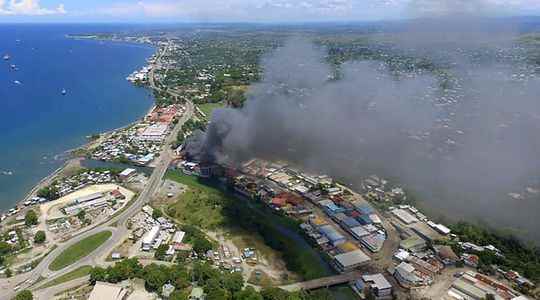Summer 1942, an expeditionary force led by the Americans landed in Guadalcanal, the largest of the Solomon Islands, in the middle of the Pacific Ocean. For six months, the Allies conducted a military operation to dislodge Japanese troops and secure supply routes between the United States, Australia and New Zealand. Operation Watchtower would change the course of the war. Eighty years later, a new battle of the Pacific takes place in the archipelago, but this time it opposes a new rival to the Americans: China.
On April 19, Beijing signed a security agreement with the Solomon Islands potentially allowing it to gain a foothold there militarily. Alarmed, Washington is reopening its local embassy in disaster – closed since 1993. For their part, the Australians are worried about the possible dispatch of Chinese troops 2,000 kilometers from their coasts. And France, to which New Caledonia is very close, considers the situation “worrying”.
China currently only has one overseas base
“Anything that can weaken Western positions is good for the Chinese,” explains Sophie Boisseau du Rocher, researcher at the Asia Center of the French Institute of International Relations.. The Pacific is a space that is remilitarizing and becoming a field of power struggles. The incursions of the Chinese navy into this maritime area – not only warships but also fishing vessels – are going deeper and deeper: this movement is to be expected to intensify.”
This Chinese advance comes after the formation of the Aukus military alliance (Australia, United Kingdom, United States) last September. Beijing seeks to challenge US military dominance in Asia-Pacific, but lacks bases to accommodate its fleet, which already has more ships than the US Navy. The communist regime can certainly rely on a global network estimated at more than 90 ports owned or operated in part or in whole by Chinese companies. Ideal infrastructure for refueling, supplying and repairing ships in peacetime. But it also needs facilities to station military personnel, store weapons and equipment, such as in Djibouti, in the Horn of Africa, where China set up its first military base abroad in 2017 (1,500 soldiers are stationed there). Originally presented as a logistics base, Djibouti has become an essential part of the Chinese chessboard, but weighs little against the 800 American bases.
“Many experts are questioning the possible military use of the ports built under the label of the “New Silk Roads”. Setting up a network of bases and strongpoints takes time, it will be a process of ten or fifteen years. On this horizon, we will have a new global geostrategic map”, analyzes Sophie Boisseau du Rocher.
According to the Pentagon, China has approached at least eight other countries since 2018 (United Arab Emirates, Namibia, Equatorial Guinea, Cambodia, Solomon Islands, Papua New Guinea, Kiribati and Vanuatu) to host new bases – without success for the Pentagon. instant. And the recent election of Ferdinand Marcos Jr in the Philippines, who announced his desire to maintain the strategy of distancing from the United States, will certainly be exploited.
Anti-China riots
In an attempt to counter this Chinese push, President Joe Biden organized a summit with the countries of Southeast Asia on May 12 in Washington. “This Sino-American tension could have a deterrent effect on other countries wishing to conclude an agreement with China”, estimates Lucio Blanco Pitlo, professor of Chinese studies at the University of Manila, in the Philippines.
While the Solomon Islands severed diplomatic ties with Taiwan in 2019 to establish ties with Beijing, the vast majority of islanders say they are closer to liberal democracies than to China, as evidenced by the local anti-Chinese riots that took place last November. . Beijing will have to take care of its “soft-power” to win this new battle of the Pacific.
